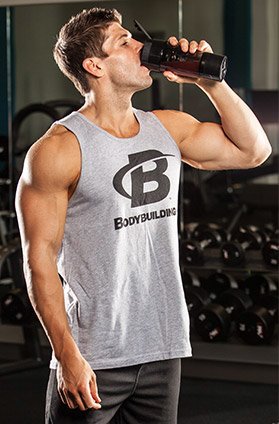Creatine is one of the most highly researched supplements available. Even if you’re relatively new to the world of bodybuilding, you’ve probably heard of it. What’s so great about creatine? Simply put, creatine helps to combat fatigue during your workouts, allowing you to work out longer and with more intensity, ultimately improving your strength and muscle size.
How It Works
In order for a muscle to contract, adenosine triphosphate (ATP) must break off a phosphate group, leaving behind ADP (adenosine diphosphate). The only problem with this is that our body cannot use ADP for energy. The solution? ADP takes a phosphate from your body’s store of creatine phosphate (PCr) to form more ATP. Supplementation with creatine serves to increase creatine stores and PCr availability in the body, resulting in faster ATP formation. Bottom line: The more PCr you have, the more work you can accomplish before fatigue sets it.
Taken appropriately and consistently, creatine can be one of the most effective supplements for increasing lean body mass and improving body composition, strength, and high-intensity performance.1,2 Yet myths and misinformation about safety and potential side effects still dog this supplement. Is it safe? Does it cause weight gain? Is it damaging to your kidneys?
If you’re hungry for answer, you’ve come to the right place. Here’s a look at six common myths about creatine, and the real truth behind them.
MYTH 1

There have been numerous studies conducted on creatine supplementation, all of which have concluded long term creatine use does not appear to have any negative side effects on the liver or kidneys.
Fact: There have been numerous studies conducted on creatine supplementation, all of which have concluded long term creatine use does not appear to have any negative side effects on the liver or kidneys.
There is no truth to the occasional rogue media stories claiming that creatine causes kidney stones or liver failure. Most of the concerns about the safety of creatine supplementation revolve around how well the kidneys are filtering blood.
Perhaps the confusion comes from elevated levels of creatinine (a marker used to diagnose kidney problems), which occurs following supplementation with creatine. However, this “false positive” is in no way harmful to your body. Moreover, there is no scientific evidence to suggest that chronic supplementation with the recommended creatine dose is detrimental to kidney function.3
Several studies have found no adverse effects of creatine supplementation on how well the kidneys filter blood.4,5 Additionally, there have been hundreds of studies looking at the overall safety of the supplement.
Since I don’t expect you to read through every article, here’s a quick review of the safety literature:
- 12 weeks of creatine supplementation has no effect on blood lipid profiles.6
- Long-term creatine supplementation does not adversely affect markers of health in athletes.7,8
- To date, studies have not found significant changes in renal, hepatic, cardiac, or muscle function with creatine supplementation.9
Okay, I think you get the point. The safety of creatine has been demonstrated over and over again, with some as long as five years.9 Bottom line: Creatine does not cause damage to the liver, kidneys, or any other organ for that matter.
MYTH 2
Fact: All available evidence suggests creatine is safe to use, although it may cause some minor GI distress.
There is some truth to gastrointestinal (GI) issues with creatine supplementation, but it’s rare. In fact, it’s reported than only 5-7 percent of people who take creatine experience stomachaches. Stomach distress typically occurs when you take too much creatine at once (e.g., a loading phase) or on an empty stomach.

Stomach distress typically occurs when you take too much creatine at once (e.g., a loading phase) or on an empty stomach.
In an attempt to reduce the level of GI distress, micronized forms of creatine, which have been ground into smaller form, have become readily available. The premise of micronization is particle-size reduction to increase solubility of the substance, potentially reducing GI distress. It may also allow for a quicker mix and faster absorption.10
Myth 3
Fact: There is no data that shows creatine causes muscle cramps or dehydration.
One of the most common concerns about creatine supplementation is that it can cause dehydration or cramping, particularly in hot and humid environments. This is simply not the case. On the contrary, creatine supplementation has been proposed to increase total body water, helping to maintain hydration status.11,12

One of the most common concerns about creatine supplementation is that it can cause dehydration or cramping, particularly in hot and humid environments. This is simply not the case.
Currently, there is no evidence to suggest that creatine supplementation has damaging effects on hydration or the body’s ability to regulate its temperature, with the majority of research reporting no change—or even an improvement in temperature regulation. 12,13,14,15 Researchers out of San Diego State University reported that creatine supplementation was able to blunt the rise in core temperature during 60 minutes of exercise in the heat.16
Moreover, several studies have found that creatine supplementation can provide performance enhancements in hot and humid environments, and that supplementation has no effect on muscle cramping.17,18
Myth 4
Fact: While there may be a transient increase in pressure following high doses of creatine, supplementation at recommended doses does not induce compartment syndrome.

Compartment syndrome is a condition referring to excessive pressure in the muscle compartment. So theoretically, the risk of compartment syndrome may be increased while supplementing with creatine because of fluid retention in the muscle cell and increased overall size of the muscle tissue. But let’s be real for a second. Compartment syndrome is more likely the direct result of injury or trauma—or potentially later on as a result of treatment to an injury—that leads to inadequate blood flow to tissue. If left untreated, injuries to nerves and tissues can result.
Although there have been media reports of creatine supplementation inducing compartment syndrome in collegiate football players, they don’t hold up to scrutiny. An article published in the “Journal of American Board of Family Medicine” in 2000 reported a case study of a bodybuilder who developed acute compartment syndrome.19
However, the participant had been an avid bodybuilder for five years previous, and had been supplementing 25 grams a day—5 times the recommended dose—for a year. It’s difficult to conclude whether the problem resulted from chronic supplementation with a high dose, or if the participant was training incorrectly, or if he was using any other supplements not reported in the study.
Several other studies have examined the effects of high dose creatine supplementation and compartment syndrome.20,21 While researchers did observe acute increases in compartment pressure following a high dose of creatine, symptoms did not resemble those of anterior compartment syndrome, and pressure values returned to normal shortly after the trial.
Myth 5
Fact: There is no direct evidence that creatine supplementation promotes rhabdomyolysis.
This myth became a media favorite shortly after an article published in the New York Times claimed creatine supplementation was possibly linked to rhabdomyolysis in high school football players. Rhabdomyolysis refers to a severe breakdown of skeletal muscle due to injury that typically presents with elevated creatine kinase levels and anterior compartment syndrome.22 This condition can result from excessive exercise in hot humid climates, especially when the exercise is continued for several days.23,24
According to reports, the athletes in this case were in a training camp where they performed exhaustive bouts of repetitive exercise in a hot and humid wrestling room. None of the athletes indicated they took creatine. Nevertheless, investigators speculated creatine could have caused the problem.

If anything, creatine has been shown to have a beneficial effect on hydration by increasing water retention, lowering body temperature, and reducing exercising heart rate.
The suggestion that creatine supplementation induces rhabdomyolysis has no backing in scientific literature. Indeed, creatine kinase levels are elevated following supplementation, but these levels are nowhere close to the levels associated with rhabdomyolysis. Not to mention the various studies supporting the safety of creatine supplementation on hydration levels and kidney function.
If anything, creatine has been shown to have a beneficial effect on hydration by increasing water retention, lowering body temperature, and reducing exercising heart rate.25
Myth 6
Fact: Creatine loading may lead to an initial weight gain of 0.8 to 2.9 percent of body weight in the first few days due to water being pulled into the muscle; however, this is less likely to occur following a low-dose protocol.
There is a common claim that all the weight gained with creatine supplementation is due to water weight. Indeed, several researchers have found acute increases in total body water as a result of creatine supplementation.2,15
However, while an initial weight gain may be a result of an increase in water, research consistently shows that creatine supplementation, in addition to resistance training, results in an increase in lean body mass and a decrease in fat mass, leading to improvement in body composition.26,27 This is likely due to a higher concentration of PCr and ATP stores, allowing for higher training intensities and volume.1,28
References
- Earnest CP, Snell PG, Rodriguez R, Almada AL, Mitchell TL. The effect of creatine monohydrate ingestion on anaerobic power indices, muscular strength and body composition. Acta Physiol Scand. 1995;153(2):207-209.
- Kutz MR, Gunter MJ. Creatine monohydrate supplementation on body weight and percent body fat. J Strength Cond Res. 2003;17 (4):817-821.
- Buford, T. W., Kreider, R. B., Stout, J. R., Greenwood, M., Campbell, B., Spano, M., … & Antonio, J. (2007). International Society of Sports Nutrition position stand: Creatine Supplementation and Exercise. Journal of the International Society of Sports Nutrition, 4 (6), 6.
- Lugaresi R, Leme M, de Salles Painelli VT, et al. Does long-term creatine supplementation impair kidney function in resistance-trained individuals consuming a high-protein diet? Journal of the International Society of Sports Nutrition. 2013;10 (1):1-1.
- Kim HJ, Kim CK, Carpentier A, Poortmans JR. Studies on the safety of creatine supplementation. Amino Acids. 2011;40(5):1409-1418.
- Volek JS, Duncan ND, Mazzetti SA, Putukian M, Gómez AL, Kraemer WJ. No effect of heavy resistance training and creatine supplementation on blood lipids. Int J Sport Nutr Exerc Metab. 2000;10 (2):144-156.
- Schilling, B., Stone, M., Utter, A., Kearney, J., Johnson, M., Coglianese, R., … & Stone, M. (2001). Creatine supplementation and health variables: a retrospective study. Medicine and science in sports and exercise, 33(2), 183-188.
- Persky, A. M., & Rawson, E. S. (2007). Safety of creatine supplementation. In Creatine and Creatine Kinase in Health and Disease (pp. 275-289). Springer Netherlands
- Kreider, R. B., Melton, C., Rasmussen, C. J., Greenwood, M., Lancaster, S., Cantler, E. C., … & Almada, A. L. (2003). Long-term creatine supplementation does not significantly affect clinical markers of health in athletes. In Guanidino Compounds in Biology and Medicine (pp. 95-104). Springer US.
- Hezave AZ, Aftab S, Esmaeilzadeh F. Micronization of creatine monohydrate via Rapid Expansion of Supercritical Solution (RESS). The Journal of Supercritical Fluids. 2010;55(1):316-324.
- Sobolewski EJ, Thompson BJ, Smith AE, Ryan ED. The Physiological Effects of Creatine Supplementation on Hydration: A Review. American Journal of Lifestyle Medicine. 2011;5(4):320-327.
- Lopez RM, Casa DJ, McDermott BP, Ganio MS, Armstrong LE, Maresh CM. Does creatine supplementation hinder exercise heat tolerance or hydration status? A systematic review with meta-analyses. J Athl Train. 2009;44(2):215-223.
- Wright GA, Grandjean PW, Pascoe DD. The effects of creatine loading on thermoregulation and intermittent sprint exercise performance in a hot humid environment. J Strength Cond Res. 2007;21(3):655-660.
- Mendel RW, Blegen M, Cheatham C, Antonio J, Ziegenfuss T. Effects of creatine on thermoregulatory responses while exercising in the heat. Nutrition. 2005;21(3):301-307.
- Bemben MG, Bemben DA, Loftiss DD, Knehans AW. Creatine supplementation during resistance training in college football athletes. Med Sci Sports Exerc. 2001;33(10):1667-1673.
- Kern, M., Podewils, L., Vukovich, M., & Buono, M. (2001). Physiological response to exercise in the heat following creatine supplementation. JEP online.
- Volek, J. S., Mazzetti, S. A., Farquhar, W. B., Barnes, B. R., Gomez, A. L., & Kraemer, W. J. (2001). Physiological responses to short-term exercise in the heat after creatine loading. Medicine and Science in Sports and Exercise, 33(7), 1101-1108.
- Greenwood M, Kreider RB, Melton C, et al. Creatine supplementation during college football training does not increase the incidence of cramping or injury. Mol Cell Biochem. 2003;244(1-2):83-88.
- Robinson, S. J. (2000). Acute quadriceps compartment syndrome and rhabdomyolysis in a weight lifter using high-dose creatine supplementation. The Journal of the American Board of Family Practice, 13(2), 134-137.
- Schroeder, C., Potteiger, J., Randall, J., Jacobsen, D., Magee, L., Benedict, S., & Hulver, M. (2001). The effects of creatine dietary supplementation on anterior compartment pressure in the lower leg during rest and following exercise. Clinical Journal of Sport Medicine, 11(2), 87-95.
- Hile, A. M., Anderson, J. M., Fiala, K. A., Stevenson, J. H., Casa, D. J., & Maresh, C. M. (2006). Creatine supplementation and anterior compartment pressure during exercise in the heat in dehydrated men. Journal of Athletic Training, 4(1), 30.
- Sauret, J. M., Marinides, G., & Wang, G. K. (2002). Rhabdomyolysis. American Family Physician, 65(5), 907-912.
- Hamer, R. (1997). When exercise goes awry: exertional rhabdomyolysis. Southern Medical Journal, 90(5), 548-551.
- Clarkson, P. M. (2007). Exertional rhabdomyolysis and acute renal failure in marathon runners. Sports Medicine, 37(4-5), 361-363.
- Dalbo, V. J., Roberts, M., Kerksick, C., & Stout, J. (2008). Putting the myth of creatine supplementation leading to muscle cramps and dehydration to rest. British Journal of Sports Medicine, 42(7), 567-73.
- Antonio J, Ciccone V. The effects of pre versus post workout supplementation of creatine monohydrate on body composition and strength. Journal of the International Society of Sports Nutrition. 2013;10(1):36.
- Becque MD, Lochmann JD, Melrose DR. Effects of oral creatine supplementation on muscular strength and body composition. Med Sci Sports Exerc. 2000;32(3):654-658.
- Dangott B, Schultz E, Mozdziak PE. Dietary creatine monohydrate supplementation increases satellite cell mitotic activity during compensatory hypertrophy. Int J Sports Med. 2000;21(1):13-16.
- Stockler, S., Hanefeld, F., & Frahm, J. (1996). Creatine replacement therapy in guanidineoacetate methyltransferase deficiency, a novel inborn error of metabolism. The Lancet, 348(9030), 789-790.
- Cooper, R., Naclerio, F., Allgrove, J., & Jimenez, A. (2012). Creatine supplementation with specific view to exercise/sports performance: an update. Journal of the International Society of Sports Nutrition, 9(1), 33.
- Grindstaff, P. D., Kreider, R., Bishop, R., Wilson, M., Wood, L., Alexander, C., & Almada, A. (1997). Effects of creatine supplementation on repetitive sprint performance and body composition in competitive swimmers. International Journal of Sport Nutrition, 7(4), 330-346.
Recommended For You

Separate fact from the fiction when it comes to women’s training and nutrition.

Fat loss is a long, slow journey. It’s made even slower by dieting errors. Don’t fall into the same traps that I did! Read my mistakes, learn from them, and your fitness goal will be a reality much sooner.

The best defense against failure is good information. These debunked fitness myths will help you recognize right from wrong and truth from lies!
![]() Effects of protein type and composition on postprandial markers of skeletal muscle an
Effects of protein type and composition on postprandial markers of skeletal muscle an
![]()












